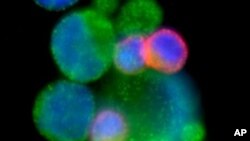Researchers have discovered that a simple blood test could lead to better diagnosis and treatment for early-stage breast cancer -- and a better prognosis for patients' survival.
The test looks for the presence of circulating tumor cells (CTCs) in the blood of women at early-stage breast cancer, before the disease has metastasized -- or spread to other parts of the body.
According to a study published June 6 in The Lancet Oncology, researchers examined survival rates and disease progression in 302 women who, already diagnosed with breast cancer, showed no obvious signs that the cancer had spread beyond the breasts or adjacent lymph nodes.
Findings of the study indicate that risk of recurrence and death was much greater in patients with higher concentrations of CTCs.
"The old idea that we can look at the primary tumor and the lymph nodes and figure out which patients are going to [have their cancer] recur is probably outmoded," says Dr. Anthony Lucci, a surgical oncologist at the University of Texas who led the study.
According to Lucci and his colleagues, nearly one-quarter of the patients had at least one tumor cell circulating in their blood. During the five-year study, ten percent of those patients died and 15 percent relapsed. But among patients whose blood contained no CTCs, just 3 percent died and only 2 percent relapsed.
All 302 women received the blood test before their primary breast tumors were surgically removed, but in some cases, says Lucci, the surgery wasn't enough.
Further studies, he says, are needed to identifiy breast cancer patients who would benefit most from the CTC test, and to determine which treatments would be most effective.
"We need to test a variety of therapies to see which ones are best at getting rid of these cells," he says. "I don't think we yet know whether standard chemotherapy regimens remove these cells in the majority of patients."
The study builds on Lucci's previous work looking for circulating tumor cells in the blood of women with later-stage, metastatic breast cancer.
While Lucci says he does not yet use the CTC blood test in his practice, he believes the test will eventually help early-stage breast cancer patients avoid painful lymph-node removal by providing improved diagnosis and treatment information.
The test looks for the presence of circulating tumor cells (CTCs) in the blood of women at early-stage breast cancer, before the disease has metastasized -- or spread to other parts of the body.
According to a study published June 6 in The Lancet Oncology, researchers examined survival rates and disease progression in 302 women who, already diagnosed with breast cancer, showed no obvious signs that the cancer had spread beyond the breasts or adjacent lymph nodes.
Findings of the study indicate that risk of recurrence and death was much greater in patients with higher concentrations of CTCs.
"The old idea that we can look at the primary tumor and the lymph nodes and figure out which patients are going to [have their cancer] recur is probably outmoded," says Dr. Anthony Lucci, a surgical oncologist at the University of Texas who led the study.
According to Lucci and his colleagues, nearly one-quarter of the patients had at least one tumor cell circulating in their blood. During the five-year study, ten percent of those patients died and 15 percent relapsed. But among patients whose blood contained no CTCs, just 3 percent died and only 2 percent relapsed.
All 302 women received the blood test before their primary breast tumors were surgically removed, but in some cases, says Lucci, the surgery wasn't enough.
Further studies, he says, are needed to identifiy breast cancer patients who would benefit most from the CTC test, and to determine which treatments would be most effective.
"We need to test a variety of therapies to see which ones are best at getting rid of these cells," he says. "I don't think we yet know whether standard chemotherapy regimens remove these cells in the majority of patients."
The study builds on Lucci's previous work looking for circulating tumor cells in the blood of women with later-stage, metastatic breast cancer.
While Lucci says he does not yet use the CTC blood test in his practice, he believes the test will eventually help early-stage breast cancer patients avoid painful lymph-node removal by providing improved diagnosis and treatment information.




